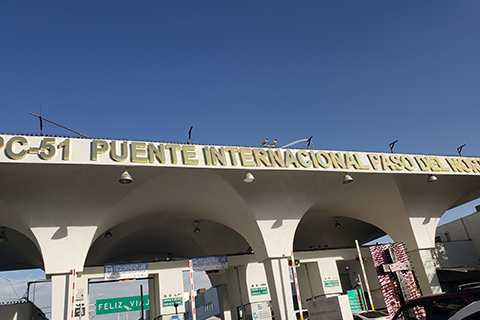
This is part two of the reflection we shared from Maria Kisumbi, Senior Associate of Policy and Government Relations at Humanity United, on her recent trip to the U.S./Mexico border.
Part one of this reflection can be found here.
Universal Declaration
Seventy years ago this month, the Universal Declaration of Human Rights (UDHR) was adopted, creating the foundation on which so many international mechanisms to defend human rights have been built. The anniversary of the Declaration is an opportunity to celebrate successes and recommit ourselves to the principles outlined in the Declaration’s 30 Articles. The United States has long been a global leader in the respect, promotion, and protection of Human Rights, a role that seems to have been put in purposeful jeopardy.
As I continue to think about the UDHR, my mind takes me back to the stories of the women I met on my visit to the border in El Paso.
Hugs, Not Walls
At the wall, I got to witness a Hugs Not Walls session. Since August 2016, the Border Network for Human Rights has organized a program known as Hugs Not Walls, which denounces the policy of family separation by encouraging family members to embrace their loved ones at the border. Families who have not seen each other for years due to immigration laws are given a chance to hug each other for a few minutes. I saw humanity, literally united.
Hugs Not Walls is an act of love among these separated immigrant families. Seeing families hug each other through the wall for a couple of minutes was heart breaking; no one wants to be separated from their family.
From the visit to the wall, we then went to listen to the stories of people affected by the U.S.’s immigration policies. The common theme in these stories was women and children fleeing from violence and murder in their countries, seeking asylum protection. Many have survived or been threatened with rape, domestic abuse, and sexual assault. Once they apply for asylum within the U.S., they then are detained in immigration detention centers and treated like criminals. In detention, they don’t have any access to legal services. After detention, they are set free, and the long wait to be processed begins. This waiting period is usually accompanied by living in fear of deportation, and a lack of health care and food. After detention, many live in poverty, and are vulnerable to crimes like human trafficking, domestic violence, and rape.
I wept listening to these women share their stories. I wept because 70 years after the signing of the Universal Declaration of Human Rights, the human rights of these women and children, which should be protected within the U.S. Constitution, were being violated. I wept because all they wanted was safety and refuge, but the response they received provided neither.
Hope and Recommitment
As I dried my tears, I remembered the families smiling while hugging at the border. I then begun to feel hopeful because there are organizations like the Border Network for Human Rights that continue to work towards the protection of the rights of these women and children. I further got consoled that there were many similar organizations still committed to stand up for our own human rights and those of others.
The United States finds itself on the border of rejecting its promise to provide true refuge to those who need it. The 70th anniversary of the Universal Declaration of Human Rights is an opportunity for human rights advocates to recommit to ensuring the protection of human rights for those fleeing into the U.S., and for the U.S. to once again embrace its responsibility to do so as well.